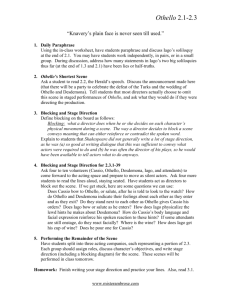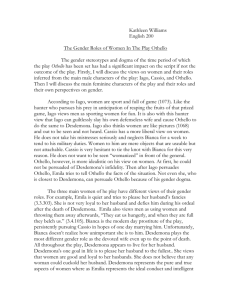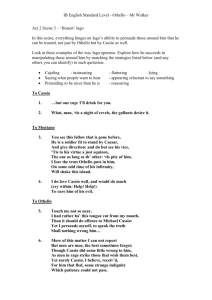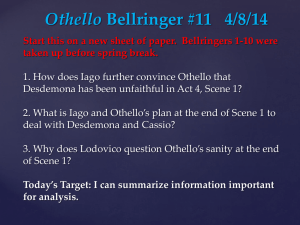Othello
advertisement
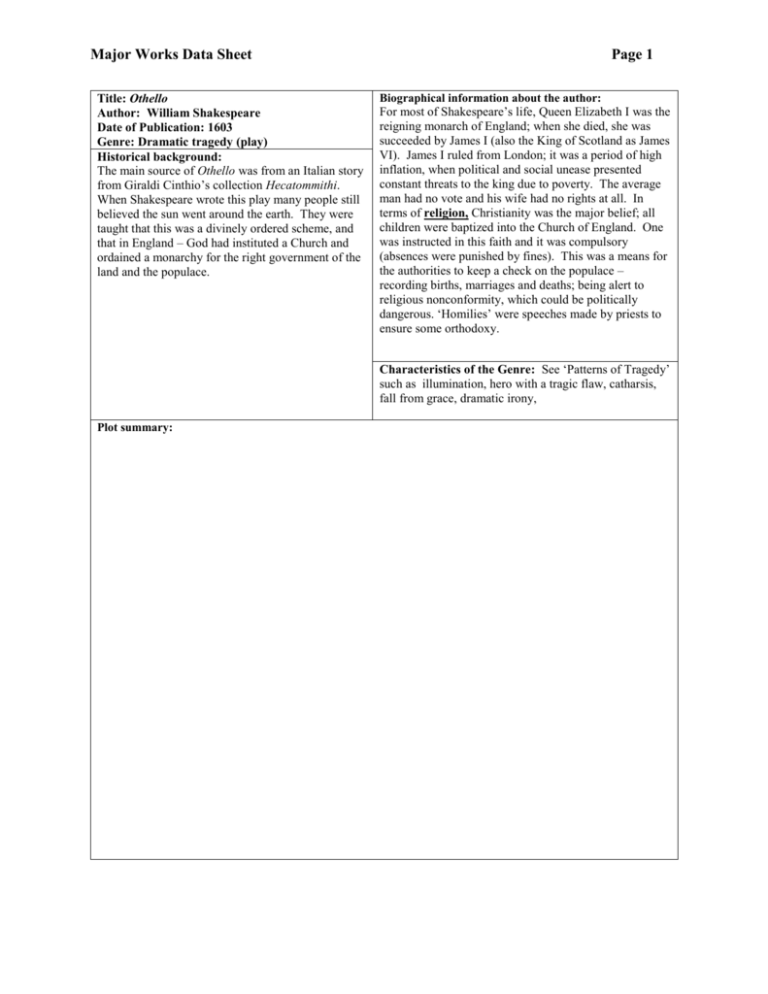
Major Works Data Sheet Title: Othello Author: William Shakespeare Date of Publication: 1603 Genre: Dramatic tragedy (play) Historical background: The main source of Othello was from an Italian story from Giraldi Cinthio’s collection Hecatommithi. When Shakespeare wrote this play many people still believed the sun went around the earth. They were taught that this was a divinely ordered scheme, and that in England – God had instituted a Church and ordained a monarchy for the right government of the land and the populace. Page 1 Biographical information about the author: For most of Shakespeare’s life, Queen Elizabeth I was the reigning monarch of England; when she died, she was succeeded by James I (also the King of Scotland as James VI). James I ruled from London; it was a period of high inflation, when political and social unease presented constant threats to the king due to poverty. The average man had no vote and his wife had no rights at all. In terms of religion, Christianity was the major belief; all children were baptized into the Church of England. One was instructed in this faith and it was compulsory (absences were punished by fines). This was a means for the authorities to keep a check on the populace – recording births, marriages and deaths; being alert to religious nonconformity, which could be politically dangerous. ‘Homilies’ were speeches made by priests to ensure some orthodoxy. Characteristics of the Genre: See ‘Patterns of Tragedy’ such as illumination, hero with a tragic flaw, catharsis, fall from grace, dramatic irony, Plot summary: Major Works Data Sheet Describe the author’s style: Page 2 An example that demonstrates the style: Memorable Quotations Quote Significance Major Works Data Sheet Page 3 Characters Name Othello Role in the story The play’s protagonist and hero. Othello is the highly respected general of the armies of Venice, although he is not a native of Venice but rather a Moor, or North African. Significance He is an eloquent and powerful figure, respected by all those around him. In spite of his elevated status, Othello is nevertheless easy prey to insecurities because of his age, his life as a soldier, and his self-consciousness about being a racial and cultural outsider. He possesses a free and open nature that his ensign Iago exploits to twist Othello’s love for his wife, Desdemona, into a powerful and destructive jealousy. Desdemona The daughter of the Venetian senator Brabantio. Desdemona and Othello are secretly married before the play begins. While in some ways stereotypically pure and meek, Desdemona is also determined and self-possessed. She is equally capable of defending her marriage, jesting bawdily with Iago, and responding with dignity to Othello’s incomprehensible jealousy. Iago Othello’s ensign (a senior position also known as “ancient” or “standardbearer”), a twenty-eight-yearold military veteran from Venice. Iago is the villain of the play. Although he is obsessive, relentless, bold, and ingenius in his efforts to manipulate and deceive the other characters— particularly Othello—Iago’s motivations are notoriously murky. At various points in the play, he claims to be motivated by different things: resentment that Othello passed him over for a promotion in favor of Michael Cassio; jealousy because he heard a rumor that Othello slept with Iago’s wife, Emilia; suspicion that Cassio slept with Emilia too. Iago gives the impression that he’s tossing out plausible motivations as he thinks of them, and that we’ll never understand what really drives his villainy. He hates women and is obsessed with other people’s sex lives. Michael Cassio Othello’s lieutenant, or second-in-command. Cassio is highly educated but young and inexperienced in battle. Iago resents Cassio’s high position and dismisses him as a bookkeeper. Truly devoted to Othello, Cassio is ashamed after being implicated in a drunken brawl on Cyprus and losing his place as lieutenant. Iago uses Cassio’s youth, good looks, and flirtatious manner with women to play on Othello’s insecurities about Desdemona’s fidelity. Roderigo A jealous suitor of Desdemona. Young, rich, and foolish, Roderigo is convinced that if he gives Iago all of his money, Iago will help him win Desdemona’s hand. A courtesan, or prostitute, in Cyprus. Repeatedly frustrated as Othello marries Desdemona and then takes her to Cyprus, Roderigo is ultimately desperate enough to agree to help Iago kill Cassio after Iago points out that Cassio is another potential rival for Desdemona. Emilia Iago’s wife and Desdemona’s attendant. A cynical, worldly woman, Emilia is deeply attached to her mistress and distrustful of her husband. Brabantio Desdemona’s father, a somewhat blustering and selfimportant Venetian senator. As a friend of Othello, Brabantio feels betrayed when the general marries his daughter in secret. Duke of Venice His primary role within the play is to make Othello tell his story of how he wooed Desdemona, and then to send Othello to Cyprus. The official authority in Venice, the duke has great respect for Othello as a public and military servant. Bianca Bianca’s favorite customer is Cassio, who teases her with promises of marriage but laughs at her behind her back. Adjectives Major Works Data Sheet Page 4 Montano The governor of Cyprus before Othello. We see Montano first in Act Two, as he recounts the status of the war and awaits the Venetian ships. Lodovico One of Brabantio’s kinsmen, Lodovico acts as a messenger from Venice to Cyprus. He arrives in Cyprus in Act Four with letters announcing that Cassio is to replace Othello as governor. The Handkerchief Setting Significance of Opening Scene Symbols Significance of the Closing/Ending The handkerchief symbolizes different things to different characters. Since the handkerchief was the first gift Desdemona received from Othello, she keeps it about her constantly as a symbol of Othello’s love. Iago manipulates the handkerchief so that Othello comes to see it as a symbol of Desdemona herself—her faith and chastity. By taking possession of it, he is able to convert it into evidence of her infidelity. But the handkerchief’s importance to Iago and Desdemona derives from its importance to Othello himself. He tells Desdemona that it was woven by a 200-year-old sibyl, or female prophet, using silk from sacred worms and dye extracted from the hearts of mummified virgins. Othello claims that his mother used it to keep his father faithful to her, so, to him, the handkerchief represents marital fidelity. The pattern of strawberries (dyed with virgins’ blood) on a white background strongly suggests the bloodstains left on the sheets on a virgin’s wedding night, so the handkerchief implicitly suggests a guarantee of virginity as well as fidelity. Major Works Data Sheet The Song “Willow” Page 5 As she prepares for bed in Act V, Desdemona sings a song about a woman who is betrayed by her lover. She was taught the song by her mother’s maid, Barbary, who suffered a misfortune similar to that of the woman in the song; she even died singing “Willow.” The song’s lyrics suggest that both men and women are unfaithful to one another. To Desdemona, the song seems to represent a melancholy and resigned acceptance of her alienation from Othello’s affections, and singing it leads her to question Emilia about the nature and practice of infidelity. Old AP Questions Possible Themes



